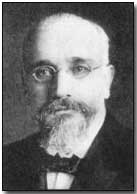Primary Documents - Eleutherios Venizelos to Greek Army Commanders Celebrating Bulgaria's Defeat, 30 September 1918
 As the Allies increased
pressure upon German forces on the Western Front, so German troops were
hastily transferred from assisting Bulgaria, leaving
Bulgarian forces severely weakened and increasingly demoralised.
As the Allies increased
pressure upon German forces on the Western Front, so German troops were
hastily transferred from assisting Bulgaria, leaving
Bulgarian forces severely weakened and increasingly demoralised.
The moment was consequently considered ripe for a major Allied offensive against Bulgarian forces, newly aided by a Greek force donated by pro-Allied Prime Minister Eleutherios Venizelos. The Allied forces in the region were led by French General Franchet d'Esperey; he determined to launch the Vardar Offensive on 15 September 1918.
Allied success was immediate and impressive; within little over a week Bulgaria solicited for a ceasefire and on 29 September 1918 Bulgaria signed an armistice, thereby exiting from the war. In consequence of Bulgaria's military defeat King Ferdinand shortly afterwards abdicated.
Reproduced below is the text of a statement issued by Venizelos to Greek Army commanders following Bulgaria's defeat and acceptance of an armistice.
Click here to read d'Esperey's official report summarising the offensive. Click here to read British regional commander Sir George Milne's account. Click here to read a statement issued by Colonel Frantzis, Greek Military Attaché in London, on 29 September 1918. Click here to read d'Esperey's official telegram to Venizelos in praise of Greek troops. Click here and here to read Milne's statements similarly lauding Greek efforts. Click here to read a statement issued by the Bulgarian government requesting a ceasefire. Click here to read the terms of the Bulgarian armistice. Click here to read the text of Tsar Ferdinand's abdication statement.
Eleutherios Venizelos to the Greek Army, 30 September 1918
Athens, 30 September 1918
To the Commander of the Army, and Generals commanding army corps and divisions:
The signing of the military convention with the enemy crowns the battles of the National Army with complete triumph.
The Government desires to congratulate the National Army and to express the gratitude of the nation for the work which it has completed. Reconstituted in the midst of so many difficulties, the National Army both from old and from new Greece has succeeded, in fighting by the side of the Allied Armies, in establishing not only the military prestige but the honour of the country as well.
The collapse of our nearest enemy heralds to us a favourable ending for our struggle and for that of our Allies. We do not of course know when this end will arrive. But with such an Army, fighting by the side of such Allies, the nation looks forward to the future with full confidence.
Glory and honour to the National Army.
VENIZELOS.
Source: Source Records of the Great War, Vol. VI, ed. Charles F. Horne, National Alumni 1923
A 'scorched earth policy' was the practice of deliberately destroying crops, food supplies and other facilities to prevent an invading enemy from using them.
- Did you know?
